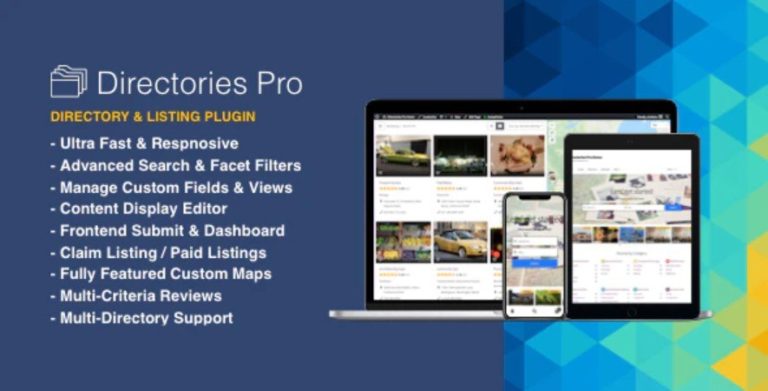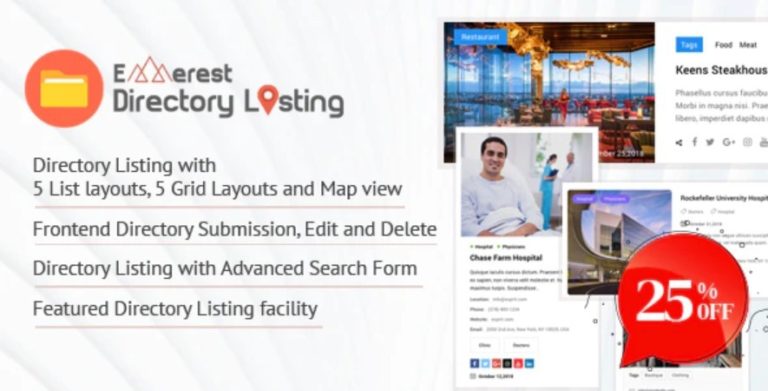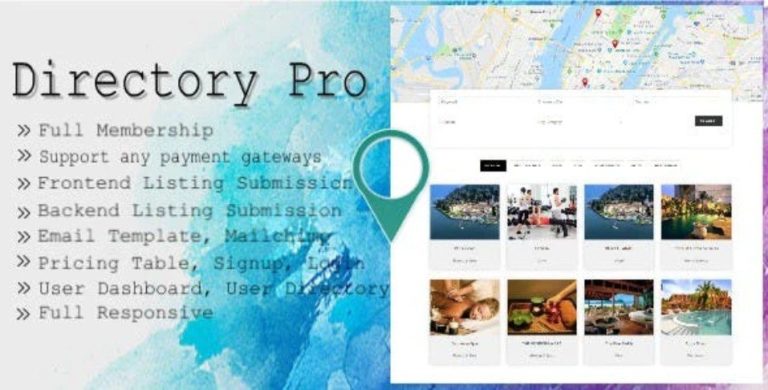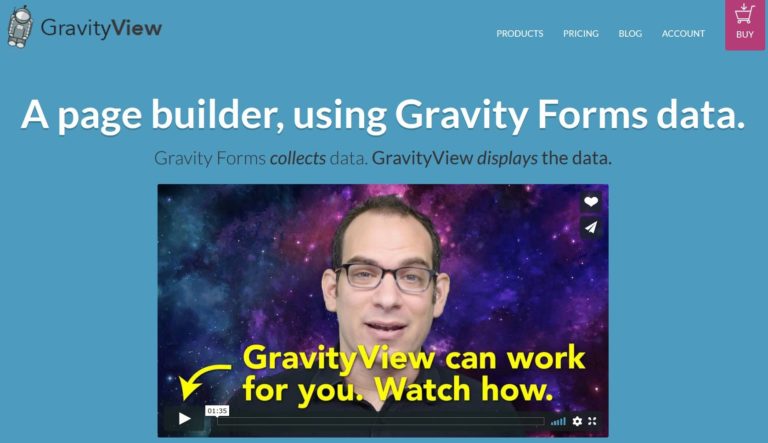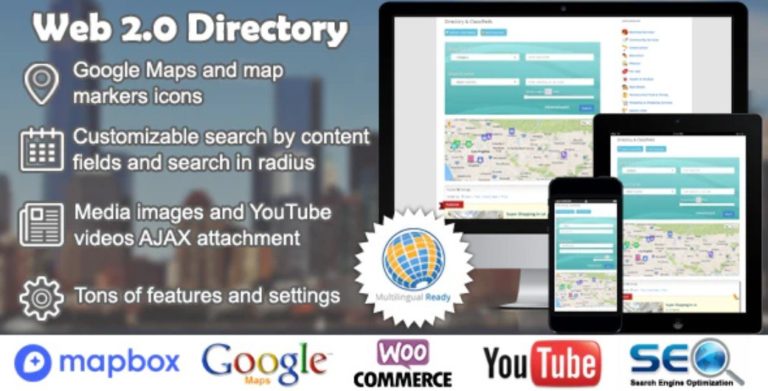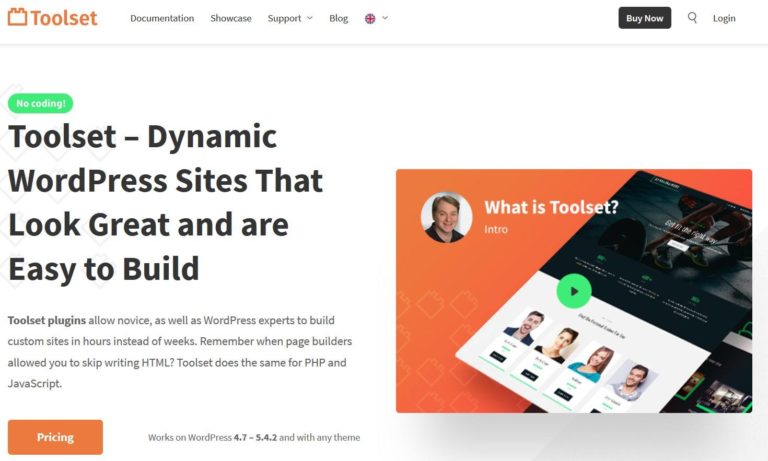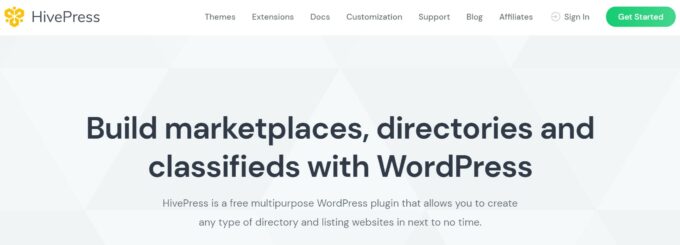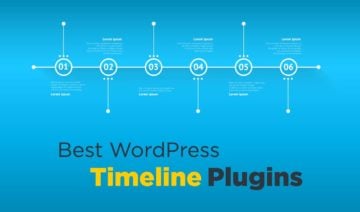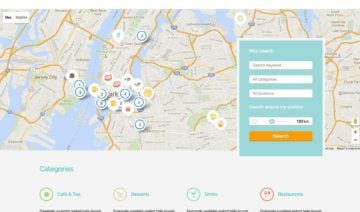Searching for the best WordPress directory plugin?
Whether you want to create a directory of local businesses, people, websites, home listings, or anything else, we’ve got a solution for you in our roundup of the best directory plugins for WordPress.
Across these plugins, you’ll find both free and paid options, simple plugins for beginners and flexible plugins for developers, plus everything in between.
There’s a lot of ground to cover, so let’s jump right in.
1. GeoDirectory
GeoDirectory is one of the most popular WordPress directory plugins. It comes in both a free version at WordPress.org as well as a number of premium add-ons that you can purchase individually or as a bundle.
GeoDirectory aims to create a scalable directory that can work just as well for one hundred listings as it can for one million listings.
Unlike some of the other plugins in this collection, it’s mostly focused on creating business directories of physical locations.
Some of the most notable features are:
- Create a directory for a single location (free version) or unlimited locations (paid).
- Offer a front-end form for visitors to submit businesses, including an option to charge for a listing with the paid version.
- Built-in forms to accept user reviews for individual listings.
- Detailed search feature, including the option to filter by proximity, rating, reviews, or date.
- CSV import/export to easily add listings.
- Google Maps integration to display listings on a map, including a cluster feature with a paid add-on.
Overall, the free version can help you create a simple, but functional, directory for a single location. However, if you want to monetize your directory or cover multiple locations, you’ll definitely want to grab some or all of the premium add-ons.
Currently, there are 18 paid add-ons and three free add-ons. Some of the most notable things that you can do with the paid add-ons are:
- Add multi-location support.
- Improve the search.
- Use custom post types for multiple types of listings (e.g. restaurants vs cafes).
- Charge people for listing their businesses.
- Add an option for business owners to claim listings.
- Accept more detailed user reviews.
GeoDirectory works with any WordPress theme. However, for a more seamless setup, the developer also offers some free and premium themes that look great out of the box. Or, if you’re more of a DIY’er, GeoDirectory has integrations with popular WordPress page builder plugins such as Elementor Pro, Beaver Builder, and Divi.
For more insight, check out our detailed GeoDirectory review too.
Price: Starts free at WordPress.org. Individual add-ons (and themes) are $19-39 each. Or, you can get a bundle of all add-ons starting at $99 with four months of support and updates.
2. Business Directory Plugin
Business Directory Plugin is another popular WordPress directory plugin that comes in both a free version at WordPress.org as well as premium add-ons that you can use to extend the core plugin’s functionality.
You can use Business Directory Plugin for a directory of content such as:
- Local businesses, such as coffee shops and restaurants.
- Service providers, such as plumbers and electricians.
- Real estate listings.
- An address book or staff directory.
You can create customizable front-end forms to let people submit listings. And if you want to monetize your directory, the plugin integrates with popular payment gateways to help you:
- Charge one-time or recurring payments to submit listings.
- Charge for “upgrades”, such as a featured listing or extra features like a contact form.
If you have a lot of listings, you can also import them via CSV.
If you need more features, there are premium add-ons to help you:
- Integrate with Google Maps.
- Access additional payment gateways.
- Support multiple locations.
- Accept user reviews.
- Improve the user search.
- Let users claim listings.
- Offer discount codes.
To help you control how your directory looks to visitors, the developer also sells eight different premium directory templates. Note that these are just themes/templates for the plugin, so they don’t replace your actual WordPress theme.
Price: Starts free at WordPress.org. You can purchase individual add-ons for $69.99 each or a bundle of all add-ons for $199.99. Premium themes are $49.99 each or $99.99 for access to all themes.
3. Connections Business Directory
Whereas the first two plugins are mainly focused on helping you create a directory of physical businesses, Connections Business Directory is a little more focused on helping you create directories of people. Here are some examples:
- An address book.
- A staff or member directory, for example, a school could use it to create a directory of teachers.
- A link directory, for example, a directory of websites.
With that being said, you can still use it as a physical business directory if that’s what you’re looking for.
Some of the features that make it more suited to the types of directories that I mentioned above are:
- Display a list of blog posts written by an author on their directory profile page.
- Add a contact form for each directory listing (e.g. let people contact a team member).
- Restrict access to logged-in users, for example, you could create an internal staff directory for your business and only give employees access.
- Link listings together, for example, if you’re creating a church directory, you could link multiple people together as a family.
In addition to some premium extensions, the developer also sells premium templates to help you control the front-end design of your site.
Overall, if you want to create a directory of physical businesses, I think there are better options on this list. But for a directory of people, this one can be a good option.
Price: Starts free at WordPress.org. Can purchase individual add-ons for $4.99–14.99 each or a bundle of all add-ons starting at $29.99. Templates are $19.99 each or you can get a bundle of all templates for $59.99.
4. uListing
uListing is a freemium WordPress directory plugin with a modern design and user experience. It’s built on Vue.js and I think it has one of the better out-of-the-box designs/experiences on both the front-end and back-end.
While you could use it to create a directory of physical businesses, uListing markets itself more towards niches such as:
- Real estate listings
- Job listings
- Event listings
- Course listings
You can add as many custom fields as needed, and uListing includes its own drag-and-drop layout builder to help you control how those fields display on the front-end.
You can also create front-end forms where people can add their own listings, including an option to charge for the listing. With user registration, you can also let users manage their own listings from a front-end profile area.
The premium version adds the following features:
- Subscription pricing plans to further monetize your directory with recurring revenue (the free version only supports one-time payments).
- Option to assign multiple user roles to a single user.
- Feature to let visitors compare multiple listings against one another.
- Social login.
- Feature to let visitors create a “wishlist” of their favorite listings.
The developer also offers its own premium theme called HomePress for WordPress sites featuring real estate listings. However, uListing will work with any WordPress theme.
Price: Starts free at WordPress.org. The premium version starts at $54.99 for use on a single site. The HomePress theme is $59 (or you can use your own theme).
5. Advanced Classifieds & Directory Pro
Advanced Classifieds & Directory Pro is a freemium plugin that’s available at WordPress.org as well as in a premium version with more features.
As the name suggests, it can help you create both a classified listings site as well as a more traditional directory.
You can let users register for accounts from which they’ll be able to manage, renew, edit, and delete listings. They can also save their own favorite listings from other users.
To control the listing pages, you can add unlimited custom fields and categories. It also supports unlimited locations, including a Google Maps integration to show listings on a map.
If you want to monetize your site, you can charge users to:
- Make their listings featured or sticky.
- Access the ability to create more types of listings. For example, you could let people create one listing for free but charge them for additional listings.
The free version is pretty functional by itself. However, if you want to monetize your directory, you’ll want to choose the premium version as most of the payment features are only available in the premium version.
Price: Starts free at WordPress.org. Paid plans start at $95.88 for one year of support and updates or $289.99 for lifetime access.
6. Directorist
Directorist is a freemium directory plugin with a modern out-of-the-box design. That is, even with just the default settings, the plugin’s front-end content looks pretty good.
The plugin lets you add unlimited custom fields to control your listings. You can let people submit listings from the front-end, including an option to charge people to submit featured listings (the premium version adds lots more monetization options).
You can set listings to expire and give people an option to renew them, which makes it great for both classifieds sites and directory sites.
If you need more features than the free version offers, the developer sells 17 premium add-ons that you can purchase individually or as a bundle. Some of the most notable extensions include:
- More monetization options, either standalone or via WooCommerce. You can even charge for individual parts of the listing, for example, an upsell to let people add more images.
- Live chat so that visitors can chat directly with listing owners.
- Social login.
- A map integration to show listings.
- Claim listing feature.
- Ability to rank featured listings.
Directorist works with any WordPress theme, but the developer also sells some of its own premium themes specifically built for Directorist. These themes look pretty good, so I think they’re a decent option if you want to use Directorist.
Price: Starts free at WordPress.org. Individual add-ons are $19-$29 each or you can get a bundle of all add-ons starting at $129. The premium themes cost $25-69 each.
7. Directories Pro
Directories Pro is a well-rated directory plugin at CodeCanyon, where it’s maintained an excellent 4.85-star rating on over 130 reviews and 3,700 sales.
The plugin can help you create directories of physical businesses, such as a Yelp clone, as well as other types of directories for users, websites, and other non-physical entities.
You can add as many custom fields as needed and arrange them using a drag-and-drop content display editor.
Users can submit listings from a front-end form and also manage their listings from their own front-end dashboard. There’s also an option for users to claim existing listings.
If you want to monetize your site, Directories Pro integrates with WooCommerce for payment processing.
To help visitors find listings, Directories Pro includes both faceted search as well as autosuggestions.
Other notable features include:
- User reviews, including an option to let people rate listings on multiple criteria.
- Integrations with Google Maps or OpenStreetMap.
- Option for visitors to bookmark reviews.
Price: $39 with standard Envato licensing (six months of support and lifetime updates for a single site).
8. Everest Business Directory
Everest Business Directory is a premium plugin at CodeCanyon that’s mostly focused on helping you create a directory of physical businesses.
Its feature list isn’t quite as detailed as some of the other plugins, but it makes a good option for lightweight free directories.
Users can submit listings from the front-end and also manage their existing listings from a front-end dashboard.
You get different templates to display listings, including a solid search feature to let visitors filter by keyword, location, category, and/or tags. There’s also a Google Maps integration so that you can display listings on a map.
One thing that the plugin doesn’t have, though, is a built-in payment feature. So if you want to easily monetize your directory (beyond ads), you might prefer a different plugin.
Price: $21 with standard Envato licensing (six months of support and lifetime updates for a single site).
9. Directory Pro
Not to be confused with Directories Pro, Directory Pro is another popular option for sale at CodeCanyon. It’s slightly less popular, with 1,200+ sales and a 4.41-star rating on 60+ reviews.
Like Everest Business Directory, it’s also mainly focused on helping you create directories of physical businesses.
Users can submit and manage listings from a front-end dashboard. You can also give them an option to claim existing listings.
One nice feature is the ability to add “Call” or “Email” buttons to help visitors get in contact with businesses.
To monetize your directory, you can create one-time or recurring “packages” that let people submit listings. You can accept payments via PayPal or Stripe. There’s also a WooCommerce integration for more flexibility.
On the back-end, you can manage what capabilities a package gives users. For example, you could give one package the ability to add videos or automatically add a featured badge to listings from users with that package.
Price: $39 with standard Envato licensing (six months of support and lifetime updates for a single site).
10. GravityView
GravityView is an extension for the popular Gravity Forms plugin. It lets you take Gravity Forms submissions and display them on the front-end of your site in a custom layout (called a “View”).
It’s not dedicated to directories per se, but this functionality is really all you need to create a WordPress directory, and it gives you lots of flexibility.
Because Gravity Forms itself is so flexible, you can create custom forms for you or others to submit new businesses to the directory.
Then, you can take those form entries and display them in four different views according to your needs:
- List view
- Google Maps view (location markers on a map)
- Table view
- Datatables
The first two options are probably the most useful for a directory, but you might find the others useful as well.
You can use drag-and-drop to control the layout and information in your views, though you’ll probably want at least a little custom CSS to control how they look.
You also get other options such as:
- Accept payments to submit to the directory via Gravity Forms.
- Let visitors rate listings on the front-end and sort by those ratings.
- Feature certain entries.
Overall, I don’t think this is the best option for casual users. But if you’re a developer, I think you’ll really like the flexibility of this solution because of its Gravity Forms integration.
Price: Starts at $69 (but you’ll also need Gravity Forms, which is a premium plugin).
11. LDD Directory Lite
LDD Directory Lite is a lightweight WordPress directory plugin that comes in a free core version at WordPress.org as well as various premium extensions.
You can use it to create a directory of local businesses, service providers, organizations, and more.
Users can submit new listings and manage existing listings from the front-end. You can also add new custom fields for listings to collect as much information as needed.
The default designs look a little basic, so you might need to add some CSS to spruce it up. The plugin is powered by Bootstrap, so you should find it pretty easy to adjust if you’re a developer.
If you need more flexibility, you can find premium extensions to help you add the following features:
- User reviews for directory listings
- Social share buttons for listings
- Social login
- Import directory listings from CSV
- Report generator (export reports to CSV or other formats)
Overall, LDD Directory Lite is simple and easy to use if you just need something basic, but it doesn’t offer as many features as most of the other plugins. For example, there aren’t any built-in monetization options or a “claim listing” feature.
Price: Starts free at WordPress.org. Extensions are $9.99–19.99 each — there isn’t a bundle.
12. Web 2.0 Directory
Web 2.0 Directory is a popular directory plugin at CodeCanyon where it’s been purchased over 7,100 times while maintaining a solid 4.52-star rating on over 300 reviews.
One of its strong points is the ability to monetize your directory. You can sell packages of listings, restrict ads by listing levels, offer featured/sticky listings, and more. You can do this via Stripe or PayPal, or integrate with WooCommerce for even more flexibility.
As for the listings themselves, you can add as many custom fields as needed, including different fields for different categories of listings. There’s also an option to add multiple locations for a single listing, which is useful for local businesses with multiple branches.
Users can submit and manage listings from the front-end. Businesses also have the option to include a contact form on their listing pages.
One cool feature for visitors is the ability to draw a search area on a map (in addition to more traditional search options, of course). Visitors can also add reviews to listings, bookmark listings, and/or download listing information as a PDF.
All in all, Web 2.0 Directory has lots of smaller unique features that might be useful to you — I encourage you to play around with the demo to see everything that it has to offer.
Price: $39 with standard Envato licensing (six months of support and lifetime updates for a single site).
13. Toolset Directory
Toolset is a suite of tools to help you work with custom content on WordPress. That is, creating/managing custom post types, taxonomies, and fields, and then displaying that content on the front-end of your site.
It’s not limited to directories, but it does include everything that you need to create a free or paid directory. The developer even offers a free course on how to use Toolset to build a directory website.
Because it’s such a flexible tool, it’ll also give you the power to 100% customize your directory to your needs.
There are a few different parts of Toolset to help you build a directory:
- Types – create custom post types, fields, and taxonomies.
- Blocks – display your custom content on the front-end using the familiar block editor.
- Forms – create front-end forms, for example, a form to let visitors submit directory listings. It also includes an option to charge people one-time or recurring fees with a WooCommerce integration.
- Access – restrict access to some/all of your site, for example, you could let registered users manage their own listings.
- Maps – display custom content on a map — great for directories where physical location matters.
Like GravityView, Toolset is definitely better suited for developers and power users. You can do everything without code, but you will need some technical knowledge to get your directory up and running. However, the upside is that you really can customize everything to your needs, which gives you a lot of flexibility.
Again, to help you get up and running, Toolset offers both a course that teaches you how to make a directory website, as well as some pre-built directory websites that you can import to use as your baseline (or just teach yourself how it works).
Pricing: Starts at $69, but you’ll need the $149 version to access all of the features that you need for a directory website.
14. HivePress
HivePress is a freemium directory plugin that works for any type of directory, from physical locations to service provider listings, classified sites, job listings, and more.
One of the most notable details about HivePress is that its free version and free extensions give you access to a lot of advanced features that other directory plugins charge for. It’s definitely one of the more flexible free directory plugins that you’ll find.
For example, with the free version and free extensions, you can add support for:
- Paid listings – Charge users for adding a listing to your directory.
- Claim listings – Let users claim existing listings, either for free or for a fee.
- Reviews – Let people rate and review listings to create your own Yelp-like directory.
- Social login – People can sign in using Google, Facebook, or other third-party services.
- Private messages – Users can send each other private messages. For example, people could contact the owner of a listing.
- Geolocation search – Users can search listings by physical location.
This is on top of all the core free features that you’d expect in a directory plugin, such as listing management, custom fields for listings, and so on.
If you want more features, the developer also sells a number of premium extensions:
- Listing statistics – Users can view stats for their listings, such as how many visits they receive.
- Bookings – Let users book listings. For example, if you have a directory of hair salons, people can book directly with the salon via your site.
- Memberships – Charge users to view listings.
- Opening Hours – Let businesses list their opening hours.
- Marketplace – Let people sell their listings (useful for classified sites).
- Requests – Let people post and receive requests (this is also primarily for classified sites).
The developer also offers free and paid directory themes powered by HivePress.
Price: Starts free at WordPress.org. The developer also offers a number of free extensions. Beyond that, you can purchase individual premium extensions for $29-$39 each. There’s currently no bundle option — you can only purchase individual extensions.
Which Is the Best WordPress Directory Plugin?
As is always the case with any WordPress plugin collection like this one, the best WordPress directory plugin depends on your needs, budget, and knowledge level.
If you’re looking for the best free options for a business directory, I would start with GeoDirectory or Business Directory Plugin. Beyond both having a free version, I also think these are two of the better plugins on this list, so they just generally make a good starting point if you’re not sure where to begin.
HivePress also has a very generous free version thanks to its free extensions, which makes it another good budget-friendly option to consider.
On the other hand, if you want something that’s going to look great right out of the box without needing any custom styling, I think uListing and Directorist have the two best default designs.
You can also use a dedicated WordPress directory theme to give your site a great design from day one.
If you’re more interested in creating a directory of people, such as team members or members, you might prefer Connections Business Directory.
Finally, if you’re a developer and/or feel pretty comfortable with WordPress concepts such as custom post types, custom fields, and templating, then you might prefer more flexible tools such as GravityView or Toolset. While I think that beginners might struggle to use these tools, these two plugins offer a lot of flexibility and powerful functionality if you can handle them.
Do you have any questions about which is the best WordPress directory plugin for your needs? Ask us in the comments!






